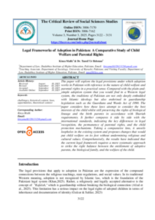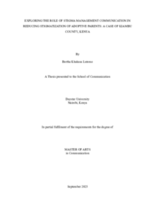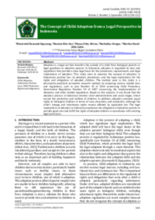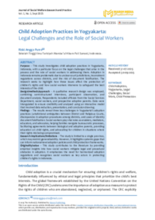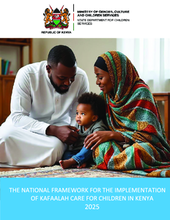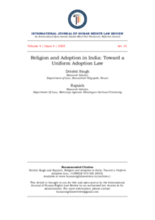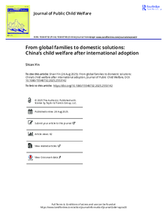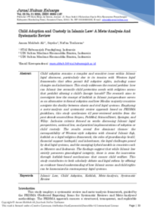Displaying 11 - 20 of 658
This package of materials on Kafaalah - was developed by the Government of Kenya in collaboration with Changing the Way We Care, UNICEF, and other key development partners and civil society actors.
This paper examines the legal framework governing adoption in Pakistan, highlighting how Islamic principles and the Guardians and Wards Act of 1890 shape the balance between child welfare and parental rights. Through a comparative analysis with international standards, it identifies gaps in the current system and proposes reforms to better protect children’s best interests while respecting cultural and religious values.
This study explores how stigma management communication can reduce the stigmatization of adoptive parents in Kiambu County, Kenya, where cultural beliefs often privilege biological lineage over adoption. Findings reveal that adoptive parents use strategies such as concealment, disclosure, reframing, and advocacy to challenge stigma and gradually normalize adoption, highlighting the vital role of communication in transforming societal attitudes and promoting acceptance.
This study analyzes Indonesia’s legal framework for adoption, detailing its procedures, requirements, and implications under national child protection laws. It finds that while adoption ensures children’s welfare and grants them equal rights in care and education, inheritance and lineage distinctions remain under existing legal provisions.
This study examines adoption practices in Yogyakarta, Indonesia, highlighting legal challenges such as jurisdictional ambiguities, inconsistent procedures, and document falsification. It emphasizes the crucial role of social workers in navigating these obstacles, advocating for children’s rights, and supporting families throughout the adoption process.
The Government of Kenya’s National Framework for the Implementation of Kafaalah Care provides structured guidance for practitioners, aiming to promote childcare to family-based settings. It outlines roles, coordination mechanisms, and monitoring strategies to ensure safe, standardized care for vulnerable children, and is intended for use by both state and non-state child protection practitioners.
India’s adoption laws have evolved over more than a century, creating parallel systems that affect eligibility, speed of adoption, and the rights of adoptive families. This study examines the historical origins and gaps in these laws and advocates for a unified framework that aligns with constitutional and international standards.
China’s decision to end its international adoption program after 30 years affects over 160,000 children, many with disabilities, raising concerns about increased institutionalization and developmental risks. This commentary highlights the need for reforms such as expanding domestic adoption, improving foster and kinship care, enhancing institutional quality, and strengthening cross-sector collaboration to create a more family-centered child welfare system.
Child adoption remains a complex and sensitive issue within Islamic legal discourse, particularly due to its tension with Western legal frameworks that often permit full adoptive rights, including name changes and inheritance. This study addresses the central problem: how can Islamic law reconcile child protection needs with religious norms that prohibit altering a child’s lineage? The research aims to investigate how the concept of kafalah in Islamic jurisprudence serves as an alternative to formal adoption and how Muslim-majority countries navigate the duality between sharia and civil legal systems.
In this video, practitioners, faith leaders, and a Kafaalah caregiver share experiences in promoting and strengthening Kafaalah as an important part of family-based alternative care in Kenya.

